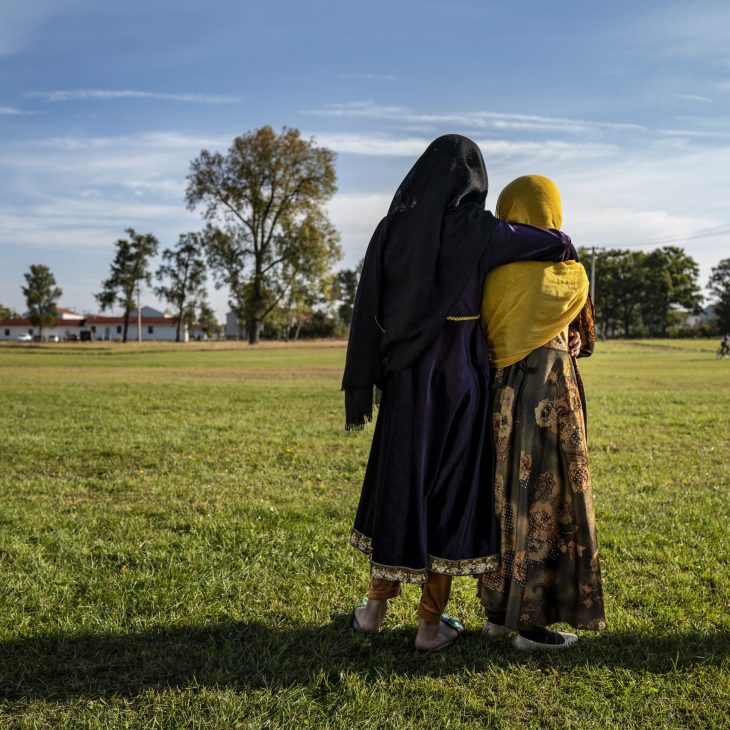How Faith and Friendship Formed a Bridge for a Refugee Family
December 9, 2022

It all started with the automated and impartial tones of the Google Translate app. Sorry, we’re a little tired. The young couple standing across from me in an empty Chicago apartment looked shyly to see if I understood the translation.
Of course they were tired. They had just arrived with two suitcases and a backpack from a three-month stay at an army base in Virginia. The events that brought them there were unthinkable. And yet they were sprayed across every major news outlet.
Many of us will forever remember the day Kabul fell back under Taliban control on August 15, 2021. We won’t forget the images of men, women, and children packed onto aircrafts while others desperately clung to the wings at lift-off.
With time, Mohammed and Mahsa’s traumatic departure would be shared in pieces as they processed the events. For now, I only knew that their service for the U.S. government in Afghanistan had landed them here in Chicago. In this empty apartment. With a white, American woman who didn’t speak their language and seemed just as unsure as they were.
My work with a local nonprofit had brought me here. Our staff was working around the clock with the influx of Afghan evacuees; this was just one of the hundreds who would come to Chicago in the weeks ahead. I would help welcome many families in those months but something about this young couple across the room felt different.
Twenty minutes after that first Google message, we stood huddled in the same corner to better pass an iPhone with words patchily translated between Dari and English. Within forty 40 minutes, there were jokes about arranging my marriage to a brother in Afghanistan. Within an hour, Mahsa was sharing a book of poetry she was hoping to publish before the Taliban takeover.
We said goodbye that night, but I couldn’t walk away. I went back to visit the next week and the week after. After a few months, we had created our own language made of Google Translate, Dari and English phrases, and elaborate games of charades.
We knew each other well enough to communicate basic information, but the barriers to genuine understanding were clear. There was nearly every difference between us: Language, culture, religion, ethnicity, worldview, and more. As my tongue tried and failed to work around Dari words or see cultural nuances born out of years of tradition, I quickly became disheartened.
However, things began to shift when started talking about our faith.
The first week I went back to visit, Mohammed and Mahsa had unpacked the few things they brought from Afghanistan. Mahsa showed me what now stood as the only decoration in the apartment. They were delicate bowls intricately painted with the names “Allah” and “Mohammed” in Arabic script, placed in the center of the room.
One day, as we grow in capacity to understand each other, we will grow even deeper in the capacity to love each other too.
I quickly learned that Mohammed and Mahsa’s faith is something that carried them through tragedy and loss just as they carried this precious representation across oceans and nations. After a short time, they found a local mosque and joined other Muslims in Chicago for religious festivals, prayer, and fasting.
As a Christian raised in a post-9/11 world, I was taught only how to fear Islam. I was lectured in school and church on how to refute Islamic beliefs and values. I was told an Islamic worldview was a barrier to be debated, dismantled, and left behind.
I now have broken fast with dear friends at an iftar meal, compared with them the differences and similarities between our faith without judgment, watched them care for their neighbors, and seen how they pray for me and others. After all this, I wish I could go back in time and teach my younger self. I wish I had known sooner that what I once thought was a barrier would be the bridge to relationship and understanding.
We don’t have enough common language yet to share all the nuances of our worldview and how it shapes our faith and understanding of each other. We can’t have theological conversations about whether or not we worship the same God and what that even means. But for now, there’s a comfortable mutuality and kindred respect.
One day, as we grow in capacity to understand each other, we will grow even deeper in the capacity to love each other too. I’m sure at some point we will disagree. We might unintentionally offend each other or trip over livewires we didn’t know existed. But then we’ll laugh over tea and break bread together. We’ll continue to have new experiences and be with each other through the joyful and difficult moments. We’ll rest in the knowledge that the things which unite us are still greater than our differences.
Carissa Zaffiro works at Exodus World Service, a non-profit mobilizing the Christian community to welcome refugees in Chicagoland. She is passionate about navigating the intersection of religion and culture, helping to build bridges of inclusivity and understanding in diverse communities.
Share
Related Articles
Higher Education
What Does Interfaith Engagement Mean from an Evangelical Perspective?
American Civic Life
American Civic Life



